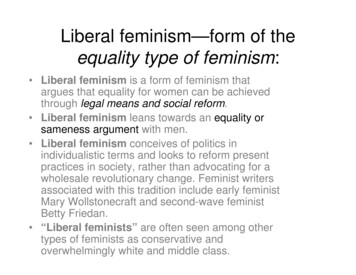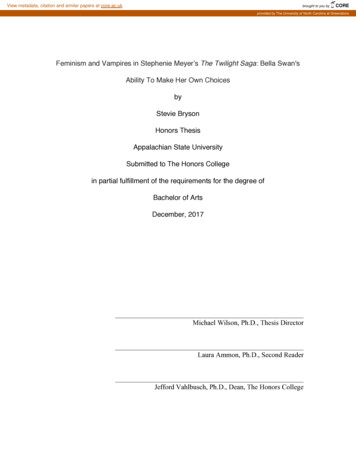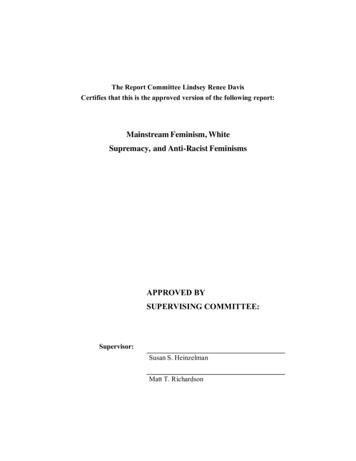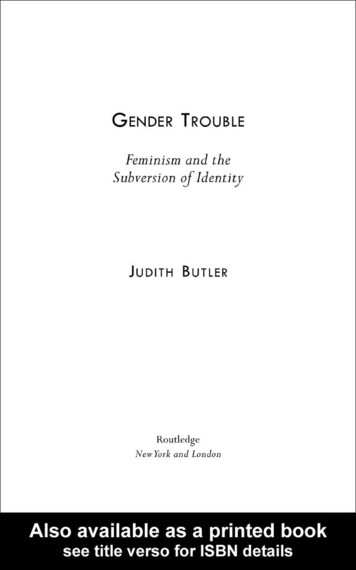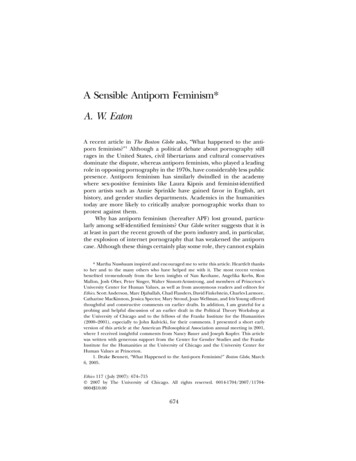
Transcription
The Ulterior Feminism of Rebeccaby M. J. SevernDaphne du Maurier’s Rebecca is critically renowned for its infusion of Gothic macabre into theromantic, the improper sinister into the English idyll. However, when considered through afeminist lens, the novel is often neglected for its lack of Brontë-style heroines. There are nopious governesses battling buried passions roaming the wings of Manderley - in this sense, theinterior turmoil of Mrs Danvers is the most akin to Jane Eyre’s. Du Maurier presents us with amorally corrupt narrator in the form of the second Mrs de Winter and a shocking bigamist inRebecca. How can we appreciate the novel in a feminist light when it is devoid of heroines?Quite simply, one could argue: the feminism of Rebecca lies not in the behaviours of its femalecharacters, but in du Maurier’s manipulation of the reader’s perception of them.Upon a first reading of Rebecca, the reader is likely to be wooed alongside du Maurier’s narratorby the brooding Maxim de Winter, privately fawning over him on roads ribboning through the
exotic Monte Carlo. In the first chapters, du Maurier spoon-feeds the unsuspecting reader what iseasily digestible: a classic rags-to-riches romance. We are familiar with this tale; we arecomforted by its smoothly solved melodramas. We recognise Maxim staring over a cliff’s edgeas perhaps just a perplexing blip soon to be resolved by the resumption of his Prince Charmingmask. We forgive du Maurier’s narrator for her gauche youth and agonising insecurities; after all,it is only by first being established as a pauper that she can be elevated from obscurity by themaster of Manderley.However, du Maurier’s narrator lacks one fundamental Cinderella characteristic, assumedin abundance by the likes of Agnes Grey and Lucy Snowe: worthiness. From the first, the secondMrs de Winter displays desperate impetuosity in the burning of Rebecca’s book inscription,cowardice in concealing her courtship from Mrs Van Hopper and an insufferable persecutioncomplex that tends to alienate the reader rather than endear. Du Maurier’s narrator, before shehas even become the corrupted second Mrs de Winter, is presented to us as unworthy of beingsaved from obscurity. The character possesses Jane Eyre’s modesty, it is true, but to anexcruciating extent; how can one identify a feminist in a narrator who has yet to discover heridentity?The second Mrs de Winter’s accumulation of wealth and status does not promote a healthydevelopment of her personality. The reader’s empathy begins to wear thin; she now possesses the
Prince and his kingdom why can’t she transcend to assume the role of Queen? Through thenarrator’s consistent self-deprecating comparisons to Maxim’s first “angel-wife” Rebecca, duMaurier presents the former as a rhododendron bud inverting.If there is an overtly feminist symbol in the novel, the rhododendron is it; though thereader associates the blood-red “monster” plant with Rebecca’s haunting influence almostexclusively, it is an image relevant to the second Mrs de Winter too. Du Maurier’s narrator hasthe potential to be a feminist but refuses to bloom due to her restrictive masochism. However,her eventual germination, first stunted by her self-criticism, is satisfying to the feminist readerdespite its wildly perverse petals.The second Mrs de Winter condemns any sense of sisterhood in becoming Maxim’s accomplicewhen he confesses to murdering Rebecca. Instead of staple Gothic horror, du Maurier’s narratorfeels obsessive relief: “he never loved Rebecca never, never”. She is only able to assume heridentity as the real Mrs de Winter when the former has been denounced as the “devil”. Byrefusing to acknowledge assimilation with Rebecca’s fate, du Maurier’s narrator seizes bothself-preservation and the prize she covets: Maxim’s unreserved affections. Not a typicallyfeminist aspiration, admittedly, but it empowers the narrator - this is what counts. By presentingthe second Mrs de Winter as a woman bent irrevocably on achieving her goal of becomingMaxim’s Mrs de Winter, the one and only, du Maurier thus asserts her as a feminist heroine: thenarrator is willing to sacrifice her innocence by becoming a murder accessory, willing tosacrifice anything single-mindedly, in order to get what she wants. The reader can now assimilatea heroine-type with this headstrong rhododendron of a woman, even though it costs the reductionof Rebecca, her fellow suffering wife of the patriarchy’s ruthless propriety, to a weed.
Rebecca herself is more overtly imbued with face-value feminist ideals than her successor.Throughout the first two-thirds of the novel, du Maurier presents her through the narrator’sidealisations as the Perfect Woman; she had “beauty, brains and breeding”, as Maxim’sgrandmother claims. However, it is not Rebecca’s alleged flawlessness that impresses her as aheroine upon the reader - it is the shredding of this mirage by du Maurier.Maxim vilifies Rebecca as he recalls her promiscuity, manipulation and privatehumiliation of him in exchange for public success. Du Maurier morphs the feminist reader’sperception of Rebecca, ironically, in her favour; we learn that she condemned cold,condescending Maxim’s patriarchal pedestal by making a sham of his beloved,paternally-inherited Manderley. The reader is likely to rejoice in this discovery of a duplicitouslycunning heroine who, similarly to the second Mrs de Winter, will do what she wants. Du Maurieruses Maxim as a pawn in his lambasting of Rebecca in order to secure her as a heroine that thereader can identify with; she is ultimately perceived as a flawed, multi-faceted woman rebellingagainst the societally-imposed fetters of her gender. As she turns to “dust” for the triumphantnew Mrs de Winter, Rebecca “steps out of the shadows”, out of the page, for the reader; shebecomes real. Du Maurier herself behaves with feminist scruples as, by decrying the illusion ofRebecca, she tears apart the unattainable mirage of the Perfect Woman.Of course, du Maurier’s plot orchestration means that Rebecca is lethally punished for hergender-subversion; her Eyreian autonomy is drowned. However, du Maurier ensures thatRebecca remains inextricable from Maxim’s conscience and, thus, inextriable from feministresurgence; as her boat - with her body inside - is symbolically dredged from the bay, Rebecca’sthreat upon the patriarchy is ressurrected. Maxim escapes accountability for her murder, yes, butRebecca’s self-governing torch is passed through the surface of the sea to the second Mrs deWinter, who claims it as her own and moulds it to suit her own desires. Through the latter’sassumption of power, du Maurier diminishes Maxim to a mere “child” and Mrs de Winter, thefirst and second now interchangeable, gains control of Manderley once more.
Rebecca surpasses du Maurier’s fictive medium and becomes a tangibly imperfect woman to thereader: a believable feminist. Consequently, the narrator inherits Rebecca’s faculty over the noveland asserts her power within its well-thumbed pages. Both can be considered as anti-heroinesdue to their respective misconduct. However, in this novel’s case, the term anti-heroine is surelyanalogous with feminist, as it is only through their misconduct that du Maurier’s women achieveliberation. Du Maurier encourages the reader to peer through naiveties and delusions in order todredge Rebecca’s ulterior feminism from the depths.Image sources:Rebecca by Daphne du Maurier and Book at the Door Winner « Behind the Willows“Rebecca” ‹ CrimeReadsRebecca Audiobook - Daphne Du Maurier - Listening Books (listening-books.org.uk)#WordWeek: Favourite First Lines AnOther (anothermag.com)
analogous with feminist , as it is only through their misconduct that du Maurier 's women achieve liberation. Du Maurier encourages the reader to peer through naiveties and delusions in order to dredge Rebecca 's ulterior feminism from the depths. Image sources: Rebecca by Daphne du Maurier and Book at the Door Winner « Behind the Willows .


